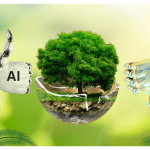Executive Summary
- Analysis of young entrepreneurs' initiatives to combat climate change through innovative startups
- Examination of ten key climate-focused ventures addressing issues from carbon capture to sustainable agriculture
- Two key focus areas identified:
- Technology-driven solutions including carbon capture and satellite networks
- Circular economy models reducing waste and promoting sustainability
- Investment opportunities identified in green technology, sustainable agriculture, and renewable energy infrastructure
Introduction and Background
Context
- The urgency of addressing climate change has never been more critical
- Young entrepreneurs are developing innovative solutions to mitigate global warming impacts
- These efforts represent a sustainability revolution spanning renewable energy, waste management, and carbon capture
Purpose
This research examines:
- How emerging technologies and new approaches are addressing environmental challenges
- The potential for transformative change led by young founders
- The creation of new industries and opportunities for green economic growth
Significance
The intersection of entrepreneurship and climate action presents both risks and opportunities. Understanding these dynamics is essential for:
- Meeting ambitious international climate goals like the Paris Agreement
- Limiting global temperature rise to below 1.5°C
- Creating sustainable economic development paths
Data and Analysis
Innovative Climate Change Startups
Young entrepreneurs are leading ventures tackling various environmental challenges across multiple sectors:
Carbon Clean
- Founder: Aniruddha Sharma
- Focus: Innovative carbon capture technology for heavy industries like cement and steel production
- Impact: Developed scalable solutions that enable industries to capture CO2 more cost-effectively, reducing carbon footprints
Terraformation
- Founder: Yishan Wong
- Focus: Combating deforestation through scalable reforestation techniques, providing tools, funding, and expertise
- Impact: Restoring forests in regions most affected by deforestation, accelerating carbon sequestration through nature-based solutions
Climeworks
- Founder: Christoph Gebald & Jan Wurzbacher
- Focus: Direct air capture technology extracting CO2 from the atmosphere
- Impact: Working toward large-scale CO2 removal, directly addressing excess atmospheric carbon
Apollo Agriculture
- Founder: Henry Njoroge
- Focus: Technology empowering smallholder farmers in Africa with climate-resilient agricultural practices
- Impact: Improving crop yields and promoting sustainable farming while increasing food security for vulnerable communities
Lumen Energy
- Founder: Manish Gadiya
- Focus: Affordable solar energy solutions for rural communities in India and developing nations
- Impact: Enabling clean energy access in underserved regions, reducing reliance on polluting energy sources
Zero Co
- Founder: Mike Smith
- Focus: Sustainable consumer goods eliminating single-use plastic packaging
- Impact: Tackling plastic pollution through waste reduction and circular economy models
BioBean
- Founder: Arthur Kay
- Focus: Technology converting waste coffee grounds into biofuel for industrial applications
- Impact: Addressing both waste management and sustainable energy needs
Swarm Technologies
- Founder: Sara Spangelo & Benjamin Kallo
- Focus: Satellite network providing low-cost connectivity for remote areas, enabling farmers to access climate data
- Impact: Helping farmers adapt to climate change through access to crucial information for optimizing practices
Ecoligo
- Founder: Markus Schwaninger
- Focus: Connecting investors with renewable energy projects in developing countries
- Impact: Accelerating renewable energy transition in emerging markets, reducing fossil fuel reliance
Benevolent Innovations
- Founder: Sandy Apollonia
- Focus: Sustainable waste management and recycling technologies
- Impact: Reducing landfill waste and promoting circular economy principles
Impact Metrics Framework
Impact metrics are essential tools for measuring initiative effectiveness, particularly in addressing climate change:
Carbon Emissions Reduction
- Metric: Tons of CO2 avoided or removed from the atmosphere
- Purpose: Assessing effectiveness of initiatives aimed at reducing greenhouse gas emissions
- Example: Carbon Clean measuring CO2 captured by their technology, reducing industry carbon footprints
Energy Transition and Access
- Metric: Renewable energy generated or number of people with clean energy access
- Purpose: Measuring success in providing sustainable and affordable energy
- Example: Tracking households transitioning from kerosene to solar lighting, reducing costs and emissions
Water Conservation
- Metric: Volume of water saved or efficiency improvements
- Purpose: Assessing impact of water consumption reduction initiatives
- Example: Measuring water saved through climate-smart farming techniques and improved irrigation
Waste Diversion and Recycling
- Metric: Amount of waste diverted from landfills or recycled materials used
- Purpose: Measuring waste reduction and circular economy effectiveness
- Example: BioBean tracking coffee waste grounds converted into usable energy
Biodiversity and Land Restoration
- Metric: Hectares of land restored or number of trees planted
- Purpose: Measuring reforestation, land restoration, and biodiversity protection efforts
- Example: Terraformation measuring land restored to native forest and trees planted
Green Jobs Created
- Metric: Number of jobs created in sustainable industries
- Purpose: Assessing social impact through green employment
- Example: Tracking jobs created in rural areas related to sustainable production
Sustainable Product Adoption
- Metric: Number of sustainable products sold or used
- Purpose: Tracking uptake of eco-friendly products and services
- Example: Zero Co measuring customers switching to reusable products, reducing plastic waste
Reduction in Fossil Fuel Dependency
- Metric: Reduced fossil fuel consumption or fossil fuel-free households
- Purpose: Measuring clean energy and efficiency program impacts
- Example: Lumen Energy tracking households switching from fossil fuels to solar energy
Agricultural Productivity and Climate Resilience
- Metric: Improvement in crop yields or resilience to climate shocks
- Purpose: Measuring effectiveness of climate-smart agricultural practices
- Example: AgroStar tracking farmer adoption of climate-resilient techniques and yield improvements
Financial Impact and Investment
- Metric: Investment raised or revenue generated from sustainable solutions
- Purpose: Assessing financial sustainability and scaling capacity
- Example: Ecoligo tracking investments raised for solar energy projects
Key Findings
Technology-Driven Solutions
- Startups like Carbon Clean and Climeworks are leveraging advanced technologies including carbon capture and renewable energy
- Data-driven approaches through satellite networks support climate-smart agriculture and improved farmer decision-making
Renewable Energy and Clean Cooking Solutions
- Pay-as-you-go models revolutionizing solar energy access in underserved regions
- Waste-to-energy innovations providing sustainable alternatives to fossil fuels
Circular Economy Models
- Startups actively contributing to waste reduction and recycling through innovative business models
- Creating sustainable alternatives to single-use products and fossil fuel dependence
Climate Resilience in Agriculture
- Development of farming practices addressing the intersection of climate change and food security
- Technology enabling adaptation to changing climate conditions and extreme weather events
Scalable Carbon Removal and Land Restoration
- Nature-based solutions focusing on ecosystem restoration and carbon sequestration
- Innovative approaches to reforestation and ecosystem regeneration
Empowering Local Communities
- Focus on solutions particularly benefiting communities in the Global South
- Emphasis on accessibility and affordability for underserved populations
Financial Innovation and Access to Capital
- New models connecting renewable energy projects with investors
- Facilitating capital access for large-scale, sustainable infrastructure development
Focus on Measurable Impact
- Adoption of sophisticated tracking methods for environmental impact
- Emphasis on quantifiable outcomes including CO2 reductions, water conservation, and product sustainability
Recommendations
Expand Funding Mechanisms
- Establish more green investment funds, venture capital initiatives, and microfinancing options
- Increase government and private sector support for R&D, scaling, and market expansion
Foster Strategic Partnerships
- Create stronger collaboration between startups, governments, and established industries
- Develop public-private partnerships providing access to infrastructure, expertise, and policy support
Strengthen Capacity Building
- Implement mentorship and accelerator programs pairing young entrepreneurs with industry leaders
- Focus on business development, sustainability, and impact measurement capabilities
Create Supportive Policy Environments
- Implement incentives including tax breaks, adoption mandates, and financial support
- Establish stable regulatory frameworks for carbon pricing, emissions targets, and waste reduction
Facilitate Global Market Access
- Provide resources helping startups expand beyond local markets
- Create international partnerships, trade agreements, and knowledge-sharing platforms
Raise Public Awareness
- Invest in campaigns highlighting climate change solutions and startup innovation
- Target diverse stakeholders including consumers, businesses, and governments
Standardize Impact Measurement
- Develop standardized metrics and tools for measuring climate impact
- Create frameworks addressing CO2 reductions, water conservation, and biodiversity restoration
Ensure Inclusive Access
- Focus on making climate solutions accessible to all communities
- Prioritize vulnerable groups, low-income populations, and marginalized communities
Promote Cross-Sector Innovation
- Encourage collaboration beyond traditional environmental sectors
- Develop solutions addressing multiple societal challenges simultaneously
Support Emerging Technologies
- Prioritize funding for research and pilot projects testing breakthrough climate technologies
- Enable early-stage experimentation to accelerate technology commercialization
References








